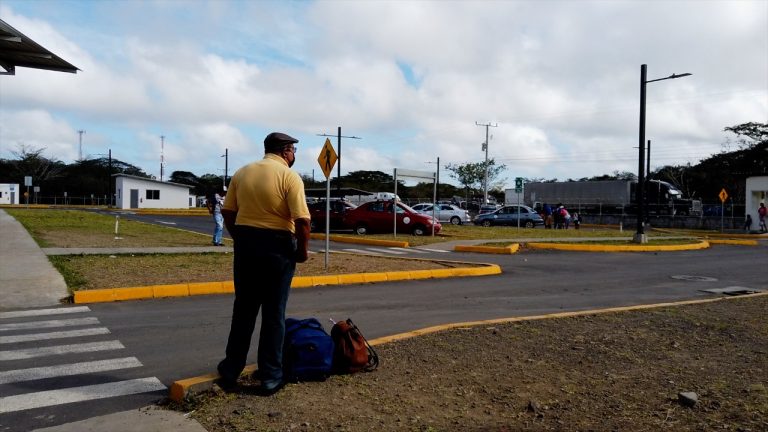18 de octubre 2022

The Return of the Military

PUBLICIDAD 1M
PUBLICIDAD 4D
PUBLICIDAD 5D
The Mesoamerican Initiative of Women Human Rights Defenders documented 16 Nicaraguan feminists who’ve been banished from their country by Daniel Ortega

Since 2018, the Ortega dictatorship has imposed a variety of migratory restrictions, including banishment, passport retentions, and harassment, against some 140 Nicaraguans, according to the Mesoamerican Initiative of Women Human Rights Defenders (IM-Defensoras)
The majority of these aggressions – 68.5% – occurred in 2021 and 2022. The incidents documented include cases of at least 16 feminist advocates who were banished in that period.
These repressive acts represent “a very serious occurrence”, since they violate the Nicaraguan Constitution, which establishes in Article 31: “Nicaraguans have the right to enter and leave the country freely.”
They also violate the American Convention on Human Rights, which specifies in Article 22, Number 5: No one can be expelled from their national territory, nor be deprived of the right to enter the same.”
“Nearly half of these aggressions (60) were directed against women who are human rights advocates, activists or relatives of advocates,” the report stated.
The IM-Defensoras explained that banishment – defined as the act of denying entrance into Nicaragua – has left an “exemplary effect” on Nicaraguans, who upon seeing how this form of repression operates, must live with the uncertainty and fear of being expelled from their country at any moment.
The Mesoamerican Initiative, which brings together feminists from El Salvador, Honduras, Mexico and Nicaragua, based their analysis on the feminist and human rights advocates. They found that the most frequent type of aggression is passport retention as a form of migration control.
In these cases, the government took away their passports permanently or temporarily, or else annulled them. The latter situation causes the victim to experience a kind of “civil death”, especially in the case of those who left the country after the violent repression of the protests.
“For all of them, not having a passport or a valid current residency permit causes problems renewing work permits, bank cards, or having an id card, among other things,” the group emphasized.
Many of the advocates have been left trapped in places with xenophobic immigration laws, which means further difficulties in moving around and having access to basic services, “leaving them at the mercy of scarcity, vulnerability and lack of protection,” they lamented.
Cases of harassment around migration issues have also been common. In a preliminary mapping the defenders carried out, they discovered at least 17 cases where there were interrogations or temporary retentions at the border posts. There were also cases of refusal to renew identification documents, delays in the issuing of documentation, and the imposition of a need to report periodically to the Migration offices to sign in.
The expulsions have had a “brutal impact” on the human rights defenders as well as their families. These people “from one day to the next, found themselves separated from their children, the people they care for, their families and loved ones. They can’t return home, to their jobs, to their struggles, to their medical treatments and their life routines.”
The group has noted that this uprooting from their families and their support networks has provoked repercussions in the mental health of the advocates thus affected. Among the chief effects seen were stress, emotional fatigue, anxiety, psycho-emotional problems for fear that their family members will be affected, anger, sleep disorders, and the fear of losing their homes, vehicles, etc.
“Daniel Ortega, Nicaragua’s feudal chief, jails and banishes women who threaten his totalitarian power. He not only seeks to punish them, but also to send out a message of terror and threats against the women that day by day continue struggling in Nicaragua for a country where neither the government nor the patriarchy can undermine people’s rights and dignity,” they declared.
In recent months, the Ortega regime has attacked the feminist movement by canceling these organizations’ legal right to exist. According to a count of the IM-Defensoras there are now 176 feminist and human rights organizations that have been stripped of their legal status.
The latest cancellations announced during the second week of October, included a women’s shelter located in Somoto, in the Madriz department of northern Nicaragua. The shelter had been created by the Mujeres Itza Collective, and was in operation at the moment their elimination was announced.
“The forced closure of this shelter is an example, among many others, of the impacts of these cancellations on the rights of Nicaraguan women, who are now left more unprotected and vulnerable in a country where femicides and macho violence are everyday events,” the Mesoamerican Initiative concluded.
This article was originally published in Spanish in Confidencial and translated by Havana Times
Archivado como:
PUBLICIDAD 3M
Confidencial es un diario digital nicaragüense, de formato multimedia, fundado por Carlos F. Chamorro en junio de 1996. Inició como un semanario impreso y hoy es un medio de referencia regional con información, análisis, entrevistas, perfiles, reportajes e investigaciones sobre Nicaragua, informando desde el exilio por la persecución política de la dictadura de Daniel Ortega y Rosario Murillo.
PUBLICIDAD 3D